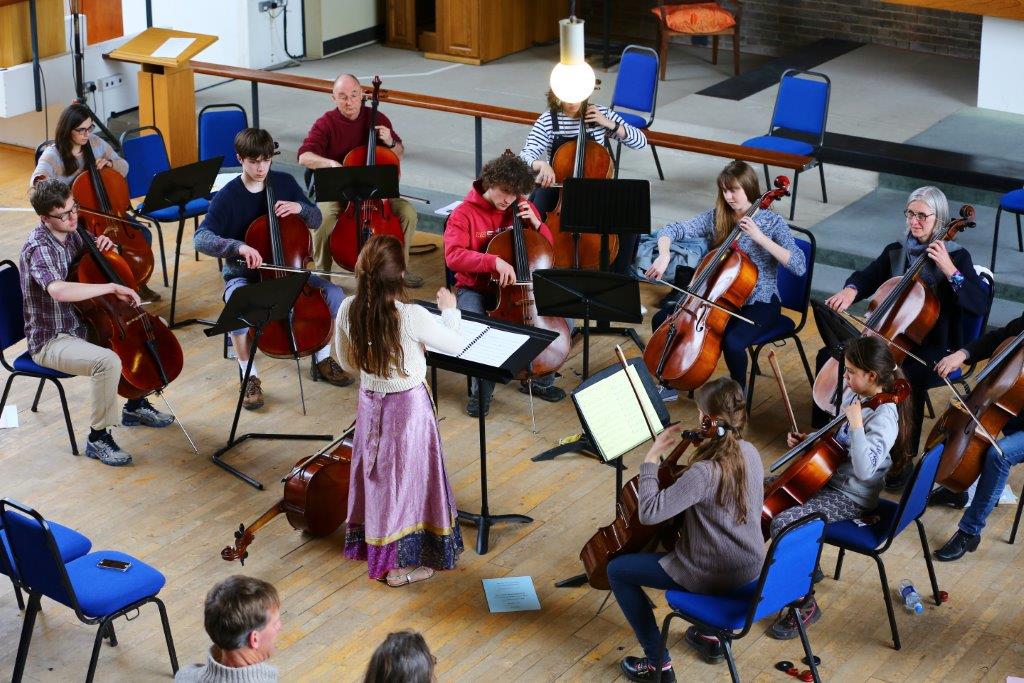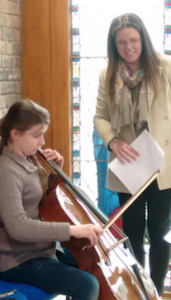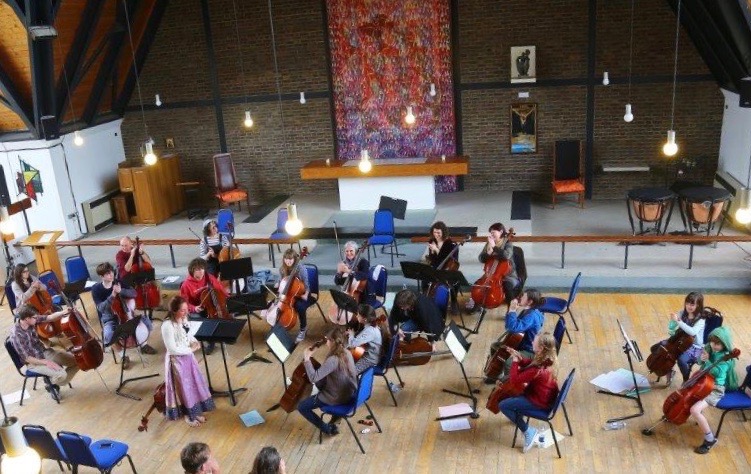I love this time of year. It is all go – there is a buzz in the air from the springtime as everything wakes up, but there is also that sense of drive as students prepare for exams and recitals, and people in general come out of the woodwork after the winter months. It’s then that we gather for the Cello Weekend. I have been running these events since at least 2004 (I’m not actually sure when I started them, but I found an old poster the other day) and every year we do something different. This year we had a lovely range of people who came from all over and I’m not sure there is actually another event quite like this one. The thing is that we all take part – the 8 year old beginner with the graduating music major and the retired professional. All play in the same cello orchestra and I think it is fair to say that all are challenged.
We have a variety of activities that take place throughout the two days that give people an insight into the different aspects of music making, performing, and collaborating with each other.Here’s a taster of this year’s event:
We always begin with a large cello orchestra session before breaking into other workshops or having a masterclass from our visiting artist. There is nothing like having the sound of 20+ cellos – it is like the richest most nourishing sonic bath. It is definitely a different experience to playing with a piano or even with a quartet.
After reading through the music and getting to grips with the way the different parts work together (we played music with between 4 and 8 different parts) then it’s time for a break – both mentally and physically – and we watch and listen. In music, a masterclass is like a public lesson: one person plays to a teacher and the teacher comments, and gives advice and tips. It is a different situation from a normal student-teacher relationship because usually the student and teacher have never met, and the audience is not passive – they are often all practitioners as well, so that means that the comments are directed at that one performer, but often (in some of the best masterclasses) they are made applicable and accessible to those listening as well.
This Cello Weekend is a unique event, because not only is it for those who are very accomplished, it is for all those who are learning. We are each somewhere along our own paths and, to me, it is a very positive thing to be able to encourage people to take advantage of opportunities for experience, tuition, and to seek guidance from those who have already covered that ground. So there is no shame in being a beginner and playing in a masterclass – actually I know the audience really enjoyed (and learned) from the advice given to each and every one of the performers across the spectrum of where they were on their cellistic paths.
Cellist Matthew Peters came to us from Worcester to give masterclasses and work with individuals throughout the two days. He was magic and inspired us all. Here is is explaining about phrasing:
And here we all get a lesson on bowing technique:
Music making isn’t just about your own instrument, and I am a firm believer in having an open mind to others so that we can understand.
Pianist Thomas Duchan talked to us about working with an accompanist, and he explained how it actually is to sit at the piano and follow someone. We got to experience the challenges of watching the music, the performer, and the keyboard first hand. Thomas had one of our cellists sit at the piano and the exercise was for her to watch the music and use her peripheral vision to also watch him – and on his (subtle but effective) cue, they would both say ‘One’. Then they moved on to having her play the notes, but this left us all in stitches – and illustrated very well the need to communicate with the accompanist about the music – everything from musical nuance and breath in the phrasing, to – in this case – the very basics! I won’t spoil the surprise – you’ll have to watch the short clip to see what happened. 🙂
Thomas asked her to play and as they hadn’t talked, he wasn’t aware that she had rests in the first bar! How simple a thing to fix that with a short conversation. His point was made so well.
And then success:
Cellists also had the opportunity to explore the blues and learn some improvisation skills with guitarist Pete Maher. That brought a smile to everyone’s face!
On Day 2 we rehearsed more, had another masterclass session, and people worked with Matthew Peters in individual sessions. Then for our last workshop challenge, we dabbled with recording by breaking into groups and toying with the Acapella app. This is just so fun, but also it teaches very very good skills. I was talking to one of the University technicians and he said to me ‘Have they really never played to a click track before?’ and I could say that honestly very few classical musicians have been trained to play to a click, listen to themselves, and to fit in with others in a precise way – and for anyone who is going to do session work in the future, it is so much better to have had some practice before you are put in the studio and told that you have one take to play the part. We had lots of laughing and fun with this one and it was perfect for breaking up the concentrated rehearsals before our final concert.
All who came on the Cello Weekend played in the final concert for friends and family, and someone said to me – there are a lot of people in the audience! Ah, but that is a good thing. It is so good to celebrate achievement, and this was definitely worth celebrating.
Please do save the date for next year:
Cello Weekend 2017: April 1-2 at the University of Chichester
Thank you so much for everyone who helped to make this Cello Weekend such a wonderful learning and joyful music making experience!




